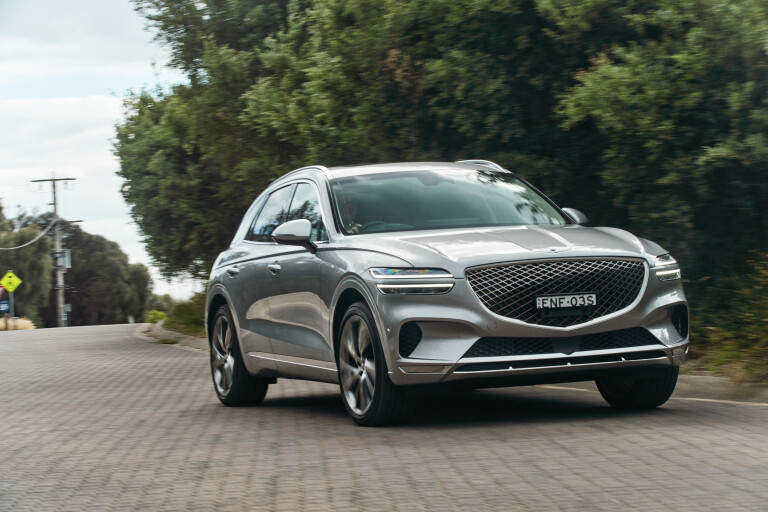
Score breakdown
Things we like
- Frugal fuel consumption
- Cabin comfort
- Interior presentation and quality
Not so much
- Unremarkable performance
- Fidgety ride
- No spare tyre for diesel variant
While there are plenty of positive attributes for the Genesis GV70 that will assume the biggest responsibility for growing Genesis sales in Australia and around the world, both performance and fuel economy were left wanting in our first drive of the Genesis GV70 2.5T AWD.
The 2.2D AWD carries a $3000 premium over that equivalent four-cylinder turbo-petrol, priced from $71,800 before on-road charges. Both models are sandwiched by a $66,400 rear-wheel-drive base model and an $83,400 flagship 3.5T AWD with a twin-turbo petrol V6.
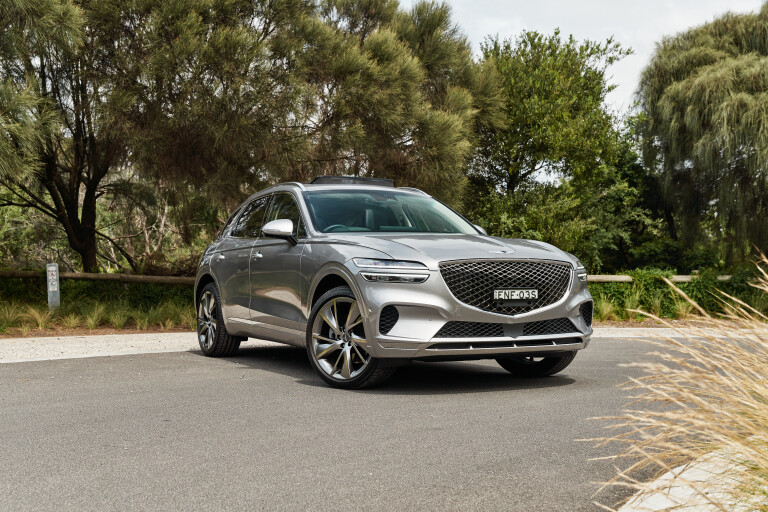
Genesis expects the diesel to be the third most popular GV70 variant, with its 20 per cent model-mix forecast behind the 2.5T AWD (45 per cent) and 3.5T (25 per cent).
Diesel offerings are certainly thin on the ground in the premium medium SUV segment – it’s very much a petrol or mild-hybrid petrol world. The GV70 2.2D’s only direct rivals are the Audi Q5 40TDI and BMW X3 20d.
The entry 40TDI undercuts the Genesis, though the GV70 is otherwise the more affordable option and not short on standard equipment.
All GV70s, for example, are fitted out with a panoramic sunroof, leather-appointed seats, electric steering wheel adjustment, electric front seats with heating/ventilation and driver memory, 3D surround view, fingerprint authentication, second-row window blinds and 14.5-inch infotainment display with augmented reality.
Without question, the GV70 joins the G80 limo in proving Genesis is not planning to make the same mistake Nissan made with Infiniti.
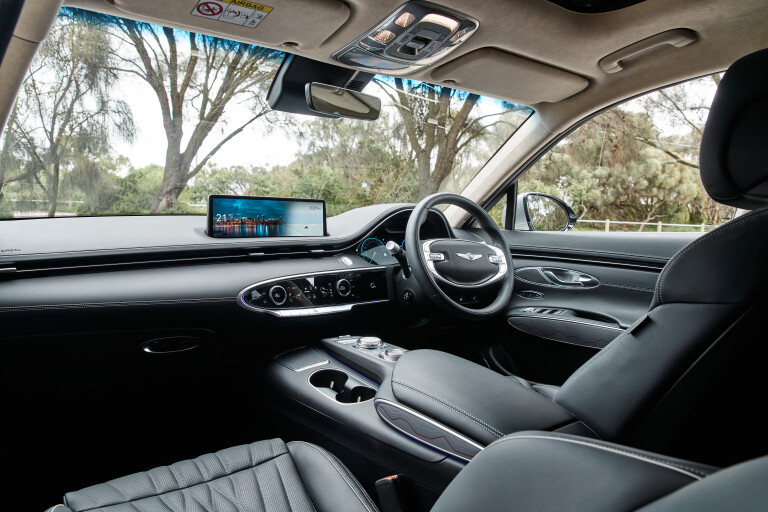
Nine out of 10 buyers, however, are tipped to add one of two option packs. Two out of five buyers will grab both.
A $4500 Sport Line Package adds various sporty aesthetics inside and out (and is standard on the 3.5T range-topper; an $11,000 Luxury Package ($6600 on the 3.5T) goes full tilt with luxury and convenience features.
Combining both on the four-cylinder models costs $13,000 to save some money, though unlike a Q5 it’s not possible to purchase individual options or cheaper option packs.
The Luxury Package – fitted to our test car – is also needed to match the tri-zone climate control and 12.3-inch fully digital driver display that are standard on a Q5, while additions such as head-up display, high-end audio system and the most advanced LED headlights are available on the Audi via a $4308 Technik Pack.
However, there’s also a quality elevation for the GV70 with the Luxury Package, which upgrades the upholstery to full quilted Nappa leather and covers the headlining and pillars in suede.
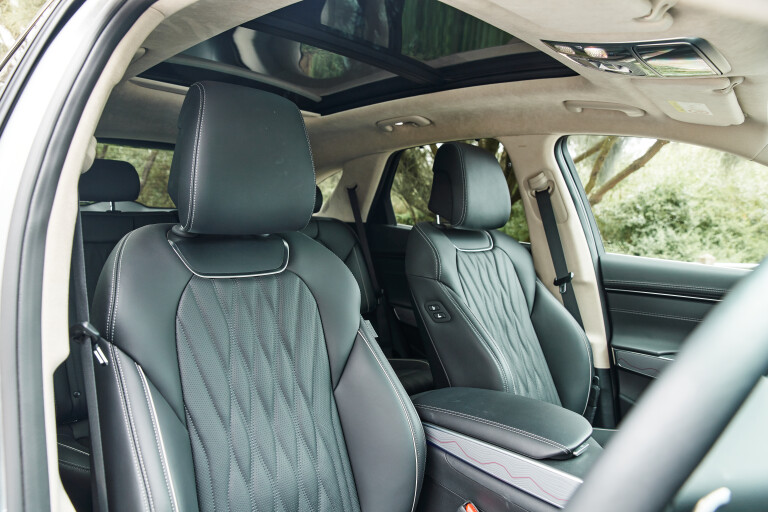
Without question, the GV70 joins the G80 limo and GV80 large SUV in proving Genesis is not planning to make the same mistake Nissan made with its Infiniti models (and even Toyota, in some Lexus cases).
The cabin experiences have the requisite design and quality to distance them from those of its mainstream parent brand.
Soft materials are in abundance, including stitched partial leather for the doors and dash, and even extend to the lower doors.
There’s artistry to the way the instrument binnacle and air vent curve and blend seamlessly into the doors, as well as the oval-shaped climate control panel that is intersected by the steering rack and features a chrome/LED surround.

Lovely details include stainless steel upper door speakers, knurled toggles on the centre console and steering wheel, the soft open/close lid for the wireless charging slot, and an ornate centre console section featuring dual rotary dials.
The rotary transmission selector looks particularly posh with knurled edges topped by a translucent disc.
Even after a week of ‘ownership’, however, we found it easy to accidentally reach for the infotainment dial rather than the close-proximity rotary gear selector.
The infotainment dial is also essential for controlling the central display as, while it’s a touchscreen, you would need arms like Mr Tickle to reach it comfortably.
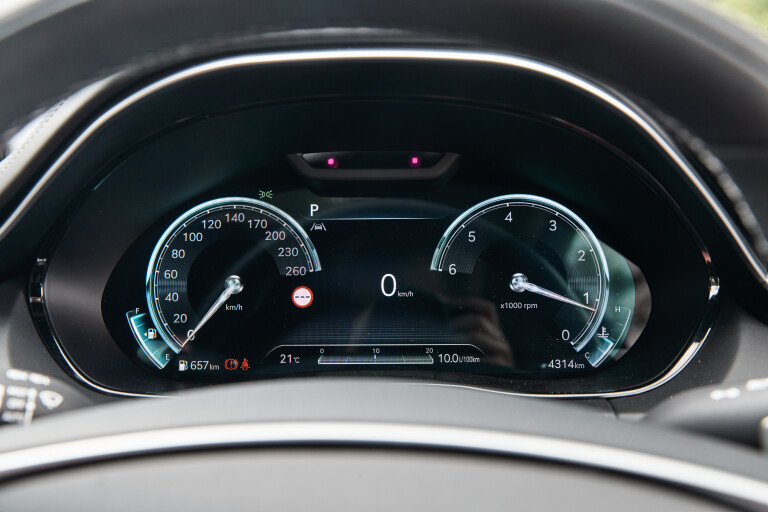
Front-seat comfort is excellent, though, with the Luxury Package not only adding additional electric adjustment but also a massage function.
Rear passengers aren’t treated as lesser occupants. While a chunky transmission tunnel rules the middle seat out for adults, the outer seats are perfectly cushioned, supportive and include recline adjustment.
They are complemented by a good amount of legroom, while headroom clearance is good even with the panoramic sunroof. ISOFIX points feature in the outboard seats.
Storage options are plentiful, too, and include smart-looking coathanger pins on the B-pillars.
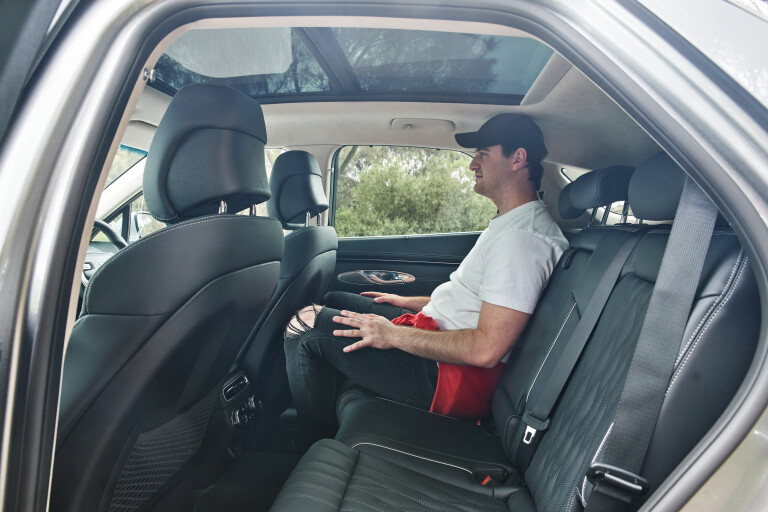
Quoted boot space of 542 litres is barely any smaller than the 550L capacities of both the X3 and Q5 (and bigger than the 510-litre Q5 Sportback). It’s a useful size that can be further expanded by pulling the release levers to lower the 60:40 seatbacks completely flat.
A cargo blind can be secreted under the boot floor, which comes with a separate carpet mat.
For buyers with country-touring aspirations, there’s disappointment under the boot floor: the addition of an Adblue tank means the diesel has a tyre mobility kit rather than the temporary spare wheel provided with petrol models.
The GV70's driveline gains additional refinement measures such as semi-active engine mounts and a thicker sound-deadening barrier.
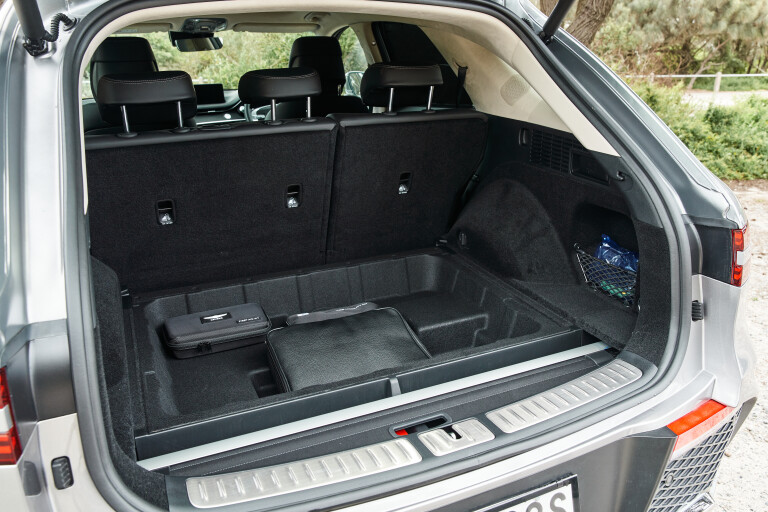
The diesel engine isn’t the Genesis-exclusive 3.0-litre inline six-cylinder found in the GV80 but instead a tweaked version of the 2.2-litre four-cylinder found in the likes of the Santa Fe. (Not unusual in the luxury segment; the Q4 40TDI shares its engine with VW, for example.)
There are both tuning differences and technical differences – such as a water-to-air intercooler rather than air-to-air as in the Santa Fe – while the GV70 gains additional refinement measures such as semi-active engine mounts and a thicker sound-deadening barrier between engine bay and cabin.
The upshot is a slightly more hushed diesel experience than in the Santa Fe – or significantly so if comparing Hyundai’s Staria people mover. Even at idle, there are no vibrations through either the brake pedal or seat, which is impressive. A stop-start system that shuts the engine off completely at traffic lights might still have been appreciated by some owners.
Working nicely with Hyundai’s in-house eight-speed auto, the drivetrain fits the luxury bill.
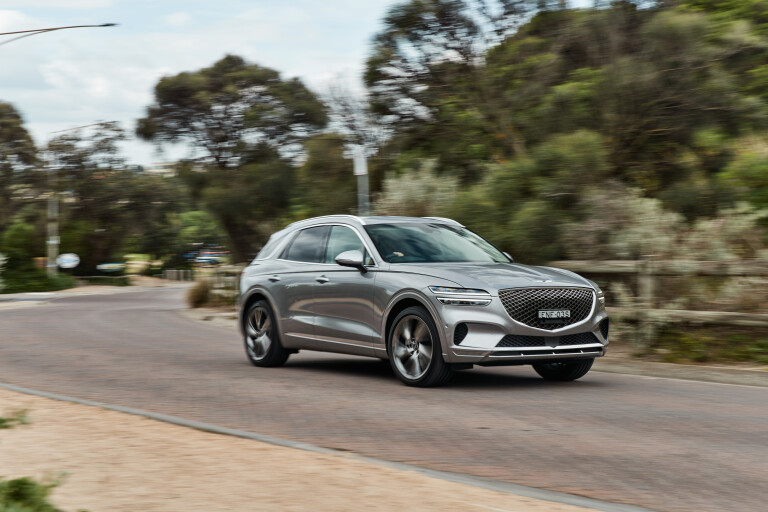
It just lacks the performance punch perhaps expected in the segment. Easily the slowest model in the GV70 pack, the 2.2D’s 0-100km/h claim of 7.9 seconds may be a tenth quicker than a BMW X3 20d but is slower than the 7.6sec Q5 40TDI.
The GV70’s issue isn’t so much outputs as weight. Where its 154kW and 440Nm compare well with the Audi’s 150kW/400Nm and BMW’s 140kW/400Nm, the Genesis weighs two tonnes where the Germans are, respectively, 1880kg and 1840kg.
Add those option packages, and the GV70 diesel also starts to get close in price to six-cylinder diesel versions of the Q5 and X3 that deliver serious acceleration – well below six seconds in the benchmark sprint.
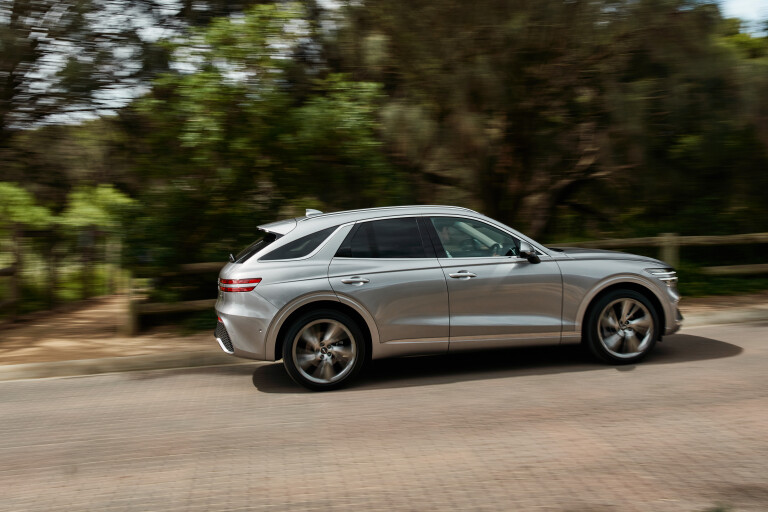
A Sport mode increases engine response but the GV70 doesn’t feel any quicker and only becomes noisier.
It’s an engine that suits a more relaxed approach to motoring, and one arguably unlikely to be picked by keener drivers who will favour the petrols.
And if fuel economy is a priority, you won’t go wrong with the diesel. Our mixed-roads testing produced an indicated 6.9 litres per 100km – better even than the official 7.8L/100km (and despite that aforementioned lack of stop-start). Official combined figures for the petrols range from 9.8L/100km to 11.3L/100km.
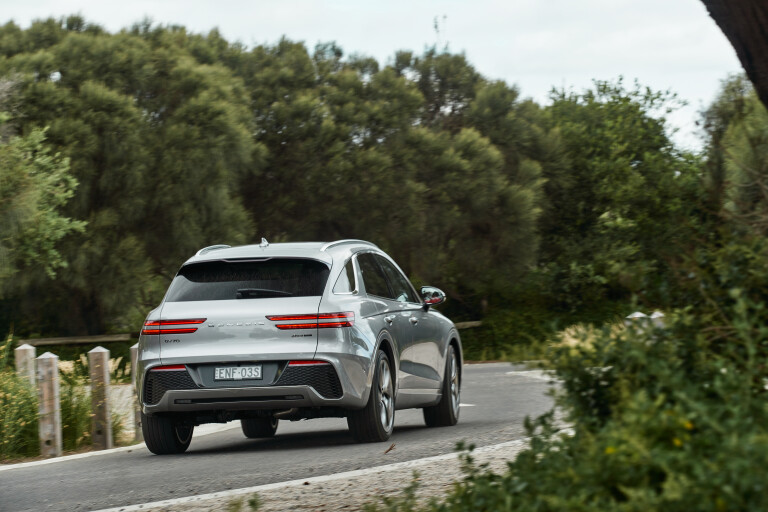
The GV70’s ride isn’t always in step with luxury driving, however. The suspension works well on freeways and pothole impacts are cushioned effectively despite the Luxury Package’s 21-inch wheels, but the Genesis is fidgety on both suburban and country roads.
It’s not a trade-off for brilliant handling that would make a BMW X3 prospect think twice. While there’s more than a modicum of roadholding proficiency, mid-corner bumps upset the GV70’s composure and the steering could be more direct and precise.
The brake pedal is also a touch too sharp on initial application.
We’re yet to drive a 2.2D on standard 19-inch wheels, or the 3.5T that comes with adaptive suspension, to assess how either factor might influence the driving experience.

A test drive of the GV70 is most recommended for buyers to ensure ride comfort and performance meet their hopes and expectations. And Genesis will even bring one to your door – as a way of compensating for the current dearth of dealerships but also demonstrating its intention to deliver a luxury experience beyond the vehicle.
Moreover, the GV70’s general refinement, interior quality, and cabin comfort are ready to surprise those willing to try an alternative to the usual premium suspects.
2021 Genesis GV70 2.2D specifications
| Body | 5-door SUV |
|---|---|
| Drive | all-wheel drive |
| Engine | 2.2-litre 4cyl turbo diesel |
| Transmission | 8-speed automatic |
| Bore/stroke | 83.0 x 99.4mm |
| Compression | 16.0:1 |
| Power | 154kW @ 3800rpm |
| Torque | 440Nm @ 1750-2750rpm |
| 0-100km/h | 7.9sec (estimated) |
| Weight | 1993kg |
| Fuel Consumption | 7.8L/100km |
| Suspension | Strut/multi-link (front) / Multi-link (rear) |
| L/W/h | 4715/1630/1910mm |
| Wheelbase | 2875mm |
| Front Brakes | 345mm ventilated discs, single-piston calipers |
| Rear Brakes | 325mm solid discs, single-piston calipers |
| Tyres | 235/55 R19, Michelin Pilot Sport 4 SUV (255/40 R21, Michelin Pilot Sport 4 SUV tested) |
| Wheels | 19 x 8.0 inches (21 x 9.0 inches tested) |
| Price | From $71,800 + ORCs |
Score breakdown
Things we like
- Frugal fuel consumption
- Cabin comfort
- Interior presentation and quality
Not so much
- Unremarkable performance
- Fidgety ride
- No spare tyre for diesel variant



COMMENTS